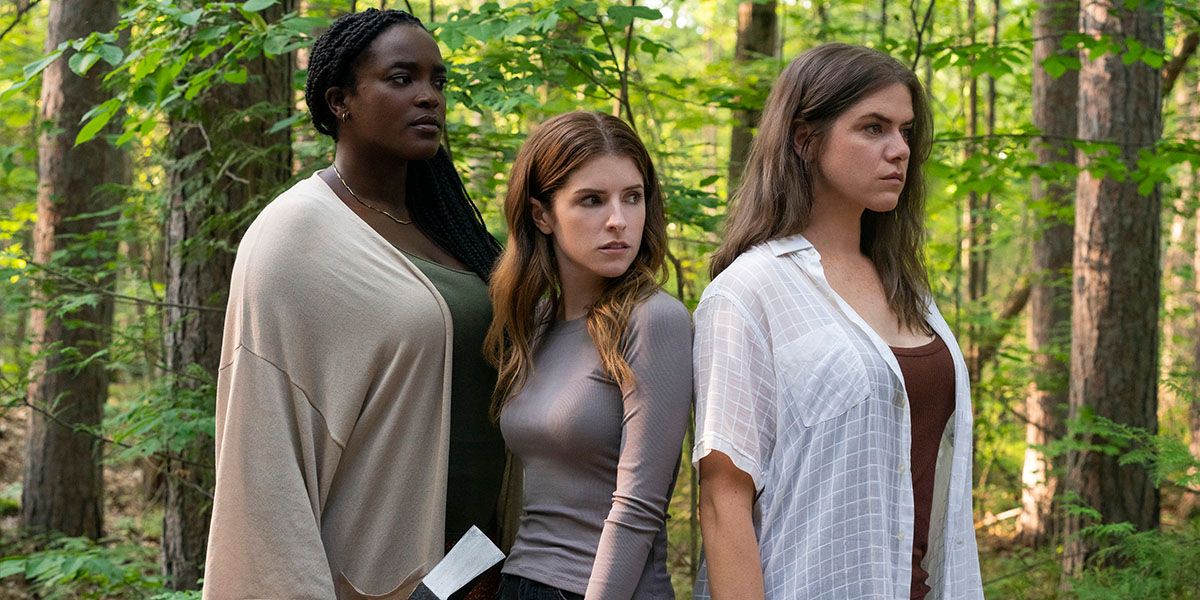Alice, Darling review: A poignant portrayal of psychological abuse

The opening shot of Alice, Darling sees its eponymous character (Anna Kendrick) looking out of a car window with a forlorn expression, winding a piece of hair tightly around her index finger. Immediately, something feels wrong. The film continues to subtly weave red flags which indicate Alice’s abusive relationship with her boyfriend Simon (Charlie Carrick) throughout the narrative.
At the beginning of the film, Alice meets up for a drink with her friends Tess (Kaniehtiio Horn) and Sophie (Wunmi Mosaku), who invite her on a week-long getaway to Sophie’s parents’ lakeside cottage to celebrate Tess’s birthday. Alice is distracted, the sharp pings from her phone rendering Simon an invisible fourth guest at the table.
The atmosphere becomes increasingly unsettling. Alice sends Simon a racy picture from the restaurant’s bathroom, sighing heavily after doing so. When she gets home and notices that the waiter wrote his phone number on the receipt, she washes the ink out with water until the paper crumbles into tiny fragments. Later, we see Alice practise the lie she’ll tell Simon so she can go on the girls’ trip.
Simon is physically absent for most of the film. Nonetheless, Alice’s frequent flashbacks of him, which show him wearing her down emotionally, make his presence in Alice, Darling strongly felt. Carrick gives a compelling performance as a charming, charismatic man with a fickle temperament.
The film’s cinematography is impressive, helping to reflect Alice’s internal experience. The colour palette of the city scenes consists of dark, neutral colours. The tall buildings which surround the petite Alice create a claustrophobic, oppressive atmosphere. Smooth, steady camerawork conveys the rigidity of Alice’s city life.
The countryside, however, comes alive with blues and greens. The use of a handheld camera lends the shots a fluidity which indicates Alice’s newfound freedom. Still, cottage country has suffocating elements which can be considered extensions of Simon – particularly the murky lake and the judgmental views of the townspeople.
Alice’s unravelling is triggered when she overhears a woman asking, “Why would she put herself in that situation?” regarding a girl who has recently gone missing. Later, Alice is told about a search party for the missing girl. She becomes obsessed with finding out what happened.
This subplot can feel like a heavy-handed metaphor for Alice’s circumstances, but its inclusion is understandable. The case helps her to avoid confronting her own trauma or spending time with Tess and Sophie – whose normalcy only accentuates Alice’s ugly reality.
The dynamic between the three friends is consistently authentic. Their drunken rendition of Lisa Loeb’s Stay embodies the heartfelt solidarity that makes female friendships so compelling to watch. Sophie is the peacemaker of the group, while Tess is more confrontational. Mosaku and Horn emote brilliantly. Shared looks between their characters convey exactly what they are thinking.
When they realise what is happening to Alice, they change their approach to help her in a meaningful way. A scene where Tess sets down a grilled cheese sandwich for Alice while Alice is in the bathtub is particularly moving. The film highlights the importance of taking care of your friends and being willing to sit with them in their hurt. Ultimately, Sophie and Tess’s willingness to remain by Alice’s side is what helps her to remain steadfast in her conviction.
Alice is written and portrayed as far from the angelic concept of the ‘ideal victim’, lending realism to her character. She bristles when confronted about her relationship. She shoves handfuls of chocolate into her mouth like a petulant child when Sophie gently suggests that she has disordered eating habits. This unapologetic characterisation of Alice as flawed is incredibly important, highlighting that there is no correct way to respond to abuse in order to be deserving of support.
Alice, Darling urges the audience to recognise that physical abuse is not the only form of abuse, nor the only form of abuse which legitimises feeling unsafe or having the right to leave a relationship. The psychological impact of Simon’s actions on Alice, rather than physical scars, is the evidence. Simon never physically hurts Alice. Instead, the abuse manifests physically through her body’s response to the relationship – vomiting, having panic attacks, and pulling her hair out.
Kendrick also does a terrific job of conveying the subtleties of Alice’s internal experience, whether through her pained smile, glassy eyes, or fidgeting. Close-up shots of Kendrick’s facial expressions elevate her performance by inviting the audience to live through Alice’s experience.
Alice, Darling depicts the internal experience, and external fallout, of psychological abuse with quiet intelligence. The film’s loose ends feel intended to reflect reality – where there are answers we never get, and healing journeys which are non-linear. Still, there is hope.
4/5.
Alice, Darling is available to purchase on Amazon Prime Video, Apple TV, Sky, and YouTube.







